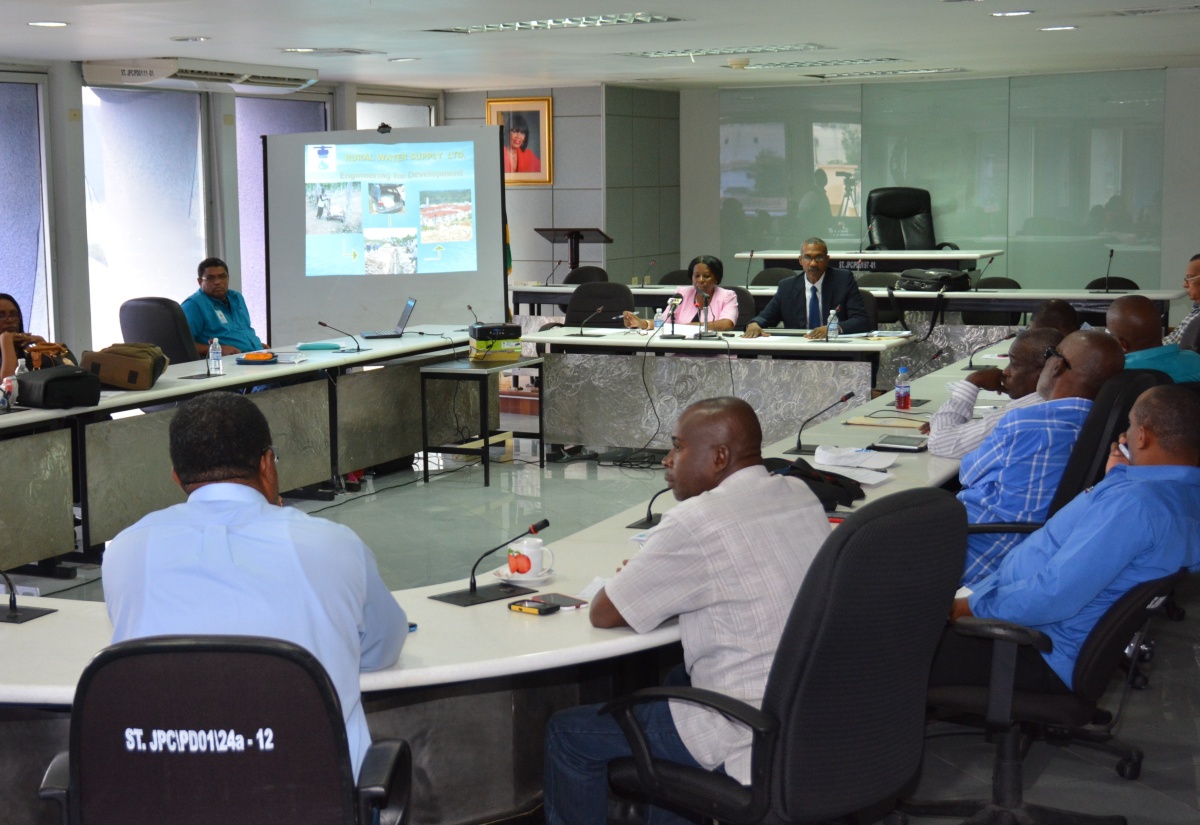Parish Councillors Sensitised About Rural Water Supply Development Strategy
By: , March 21, 2015The Key Point:
The Facts
- The strategy is a key part of the Water Sector Policy, which commits the Government to ensuring that all Jamaicans have access to potable water by 2020.
- Approximately five per cent of the rural population still rely on rivers, springs and ponds as their main water source. A further five per cent rely on trucked water and 13 per cent get water from standpipes.
The Full Story
Parish councillors were recently sensitised about their roles and responsibilities under the draft Rural Water Supply Development Strategy, at a series of consultations organised by the Ministry of Water, Land, Environment and Climate Change.
The strategy is a key part of the Water Sector Policy, which commits the Government to ensuring that all Jamaicans have access to potable water by 2020.
It represents an approach by Government to address the lack of access to adequate and reliable source of potable water, faced by many Jamaicans living in rural communities.
Approximately five per cent of the rural population still rely on rivers, springs and ponds as their main water source. A further five per cent rely on trucked water and 13 per cent get water from standpipes.
The strategy provides for coordination among the National Water Commission (NWC), Rural Water Supply Limited (RWSL), Water Resources Authority (WRA), National Environment and Planning Agency (NEPA), Parish Councils, other water service providers, communities and citizens, and it spells out the roles of the stakeholder groups in closing the access gap.
Chief Technical Director in the Ministry, Lieutenant Colonel (Ret’d) Oral Khan, who lead the consultations, tells JIS News that the consultative process was a success.
He says councillors have provided valuable information and made their positions known on the strategy especially as it impacts their constituents.
“We got feedback to validate the document. There are some gaps in it, so the consultations were important, because at the end of the day when we come out with the strategy, we want to know that we will have the full support of the councillors and stakeholders,” he notes.
He notes that the approach being taken includes re-commissioning catchment tanks and some minor water supply systems, which have fallen into disrepair or had gone out of service for lack of repair.
“The (Water) Minister is now driving an effort for these catchment tanks to be restored, to be secured, and brought back into service,” Lt. Col. Khan notes.
Another proposal is developing water shops, where people can go to purchase water at minimal cost.
Lt. Col. Khan says some councillors felt such a step would be impractical, while others wanted to participate as pilots in the project.
He explains that the water shops could be an alternative to the popular stand-pipes, which are often under no control. However, it does not mean that the use of standpipes will be eliminated.
“We believe that consumers will be willing to pay for an improved water supply where we’re able to rehabilitate a system, improve its appearance, provide treatment for the water, pipe the water, truck the water to a central point and establish the water shop, which is a more efficient facility than the (currently used) communal stand pipe,” Lt. Col. Khan says.
The consultations also looked at the matter of financing. Lt. Col. Khan says there was general recognition of a serious need for funding and to identify a source for such funds. This, as local councils, communities and even individual households will need support, especially since their potable water supply would not be provided by way of the NWC.
Meanwhile, the councillors were also briefed about the impact of climate change on the water sector.
“We stressed the need for more conservation and economical use of the water resource and the possible re-use of treated water, primarily for agricultural uses. There will also be a need to store water for the longer periods of dry spell that the country will experience. We also encouraged greater involvement in rainwater harvesting and the re-use of treated water… and they bought in to it,” Lt. Col. Khan informs.
Another critical part of the discussions with the councils was on extending water supply to “non-utility service areas” and the establishment of Integrated Water Resource Management Committees (IWRMC), which will engage residents in the management of water resources.
Senior Director of the Water Policy and Monitoring Division in the Ministry, Patricia Snow-Young, contributed to the consultations, where she is advocated for the protection of the watershed zones. She says the support of the various stakeholder bodies is critical to the process.
Ms. Snow-Young also notes that collaboration with agencies, such as NEPA and WRA, working in conjunction with the IWRMC and other stakeholders, will create a platform for water resource management that is beneficial to all Jamaicans.


